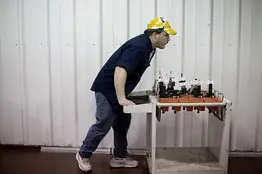 By TIMOTHY AEPPEL, Wall Street Journal
By TIMOTHY AEPPEL, Wall Street Journal
Updated April 16, 2009 12:01 a.m. ET
MEADVILLE, Pa. — The tool-and-die shops that drive this region’s economy and give this town its “Tool City USA” nickname are faring better in the current downturn than they did in past recessions.
“You’re not seeing the wholesale disruptions you might expect, because they learned from hard lessons in the past,” says Mark Turner, executive director of the Economic Progress Alliance of Crawford County, which includes Meadville.
One of those lessons is to diversify. The region’s tool-and-die industry — some 130 small and medium-sized companies making tools and parts for everything from satellites to Segway scooters — was once heavily focused on serving the U.S. auto industry. Many, especially the smaller shops, also tended to rely on just one or two big customers, which increased vulnerability during economic declines.
The 2001 downturn, which coincided with a wave of fierce foreign competition, was particularly brutal. Industry analysts estimate 15% of the region’s tool-and-die makers didn’t survive that shakeout. But many of those that remained have grown and altered how they do business.
A decade ago, Starn Tool & Manufacturing Co. did 80% of its business with suppliers to the car industry. Today, that segment of its business is 5%. The 54-employee company now makes tools used in minimally invasive spine surgery and parts that end up in everything from Boeing Co.’s new Dreamliner jets to the Kepler space probe.
Strolling through a shop filled with the noise of computer-guided machines cutting metal, William Starn, the company’s president, says that customers in the hardest-hit industries still have to buy some tools and finished parts, though they have cut back their purchases. For instance, an air-conditioner manufacturer that normally took shipments once a month is now getting them every two months.
Meanwhile, the company is seeing glimmers that other big manufacturers are starting to buy more freely again. “You can’t say ‘No’ forever,” Mr. Starn says.
Not everyone is so upbeat. Mark Hanaway, director of marketing and sales at Tech Tool & Molded Plastics, says he worries that the recession is pushing more of his customers to look for cheaper sources of tools overseas. Tech Tool laid off about a dozen workers — roughly 15% of its employees — at the end of February.
The tool-and-die industry is usually among the first to register shifts up or down in the industrial sector, because it makes the tools needed to make final goods. Meadville’s shops make everything from molds for plastic components to the dies used to cut and form parts on factory assembly lines. More of them also make the parts that their tools are designed to produce, saving their customers the time and cost of running those operations themselves.
The industry exists in pockets throughout the country, but took root in Meadville in northwestern Pennsylvania because of zippers. The first commercially successful zippers were designed and manufactured here early in the last century, and it was the need for intricate tooling to make them that gave rise to the local tool-and-die sector.
“The slowdown is hitting all of us, but we’re coping by finding new customers and new businesses to move into,” says Robert Smith Jr., president of Acutec Precision Machining Inc., which has two plants in the area.
Mr. Smith notes that after growing 25% a year for the past four years, his business will be flat in 2009. His company designs and builds its own tools, but has mainly grown by taking over the production of parts and sub-assemblies for large customers, mostly in aerospace. He hasn’t shed any workers and still has some on his staff putting in heavy overtime.
Despite the surprising strength of its tool makers, the county that includes Meadville has seen its unemployment rate rise steadily in recent months, hitting 10% in February. That is twice the level of last April, when many companies here were struggling to find and hold onto their skilled workers.
Unlike places that have fought to shed their industrial past, Meadville embraces its heritage. One of the crown jewels of the community is a thriving technical school where students learn industrial trades. Among the plaques hanging in the entryway is one dedicated to Dr. Gideon Sundbaeck, “father of the modern zipper.”
Write to Timothy Aeppel at timothy.aeppel@wsj.com
